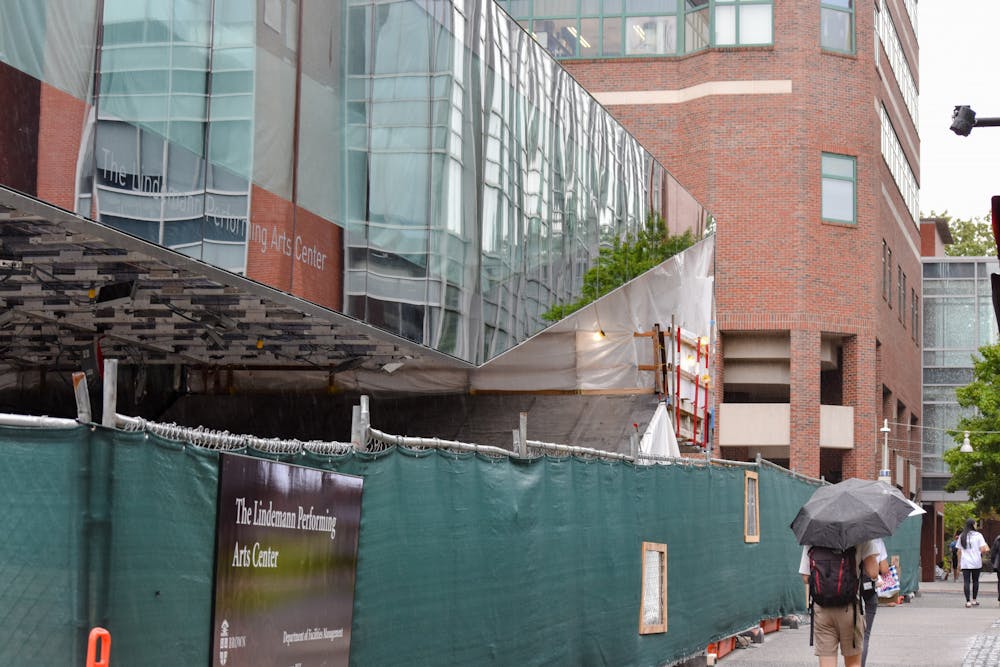The Lindemann Performing Arts Center, which has been under construction since November 2019, is scheduled to open in fall 2023.
Despite delays in construction, the project is still set to be completed on time, according to Paul Dietel, assistant vice president for planning, design and construction.
Though the new center will introduce significant performance space on campus, some student-run performing arts groups have expressed concerns that the space may not be available for their programming, as many theaters on campus are reserved for University use.
The center’s use will be overseen by the Brown Arts Institute, BAI Director of Programs and Operations Chira DelSesto wrote in an email to The Herald. Students will have opportunities to rehearse and perform in the center once it is operational, she added.
“Student groups are an integral part of the arts at Brown and programming across campus and are welcome to rehearse and perform in the Granoff Center, and soon in The Lindemann Performing Arts Center,” DelSesto wrote.
Construction updates, progress
The new building — “a very unique and complicated project” — will have the ability to transform into nine different formations with moving balconies and stage components, Dietel said.
The center “will support performance, teaching and research for music, theater and dance,” according to the Facilities Management website.
The schedule for the performing arts center’s construction was slowed after it was caught “squarely in the throes of (the COVID-19 pandemic) along with the global supply chain crisis,” but its completion date has remained the same, Dietel said.
Despite these challenges, the “finishing parts of the project are all coming together very quickly,” Dietel said. There is still interior and exterior work happening in preparation for commissioning, testing and equipment tuning, which is scheduled for the summer.
Changes in the area surrounding the project include renovations to what was formerly Olive Street — which is no longer a public street and will be a pedestrian service area for the biomedical center — and a crossing guard posted on Angell Street between Thayer Street and Brown Street. The crossing guard has been in place since July in conjunction with Providence’s Traffic Engineering Division, Dietel said.
Churchill House, across the street from the new center, is also under renovation. With the fence lines on both sides of the street limiting visibility, the city felt it was safer to have a live crossing guard given the heavy traffic in the area, he added. Dietel estimated that the crossing guard will be present until later this fall or early winter when site work wraps up and the fence is taken down.
The renovations on Churchill House began in July and should be completed by August 2023, Dietel said. The house’s occupants, the Department of Africana Studies and Rites and Reason Theatre, have been temporarily moved to Andrews House, which was vacant.
There are signs posted around the project encouraging respect for the campus. This is standard practice for all major projects, which currently include the performing arts center, Churchill House and the Brook Street dorms, Dietel explained. “Our goal is to be proactive in communicating so that we avoid conflicts between any of our workers, contractors, vendors, delivery trucks and the Brown community,” he said.
Improvements in teaching, performance
The new performing arts center aims to expand spaces for teaching, practice and performance on campus.
The music department currently uses Sayles Hall and the Salomon Center for concerts, but these meeting and lecture spaces “are not well suited to musical performance, either acoustically or logistically,” wrote Chair of Music Dana Gooley in an email to The Herald. “The lack of storage for instruments, stands and other gear has been the biggest challenge.”
There is a small recital hall at the Orwig Music Building that functions well for performances with small audiences, but not for larger ones, Gooley added.
“The new performing arts center will have a massive impact on teaching and music performance by providing state-of-the-art sound and equipment as well as good rehearsal spaces,” Gooley wrote. “Musicians learn in part by listening to themselves and critiquing what they hear,” and acoustic conditions in larger halls like Sayles make it very difficult to do so.
“The varying configurations of the hall, moreover, will be a great benefit to the diversity of music represented in our department, including electro-acoustic music, chamber music and Ghanaian Drumming alongside the more traditional large ensembles,” he explained.
Gooley added that the music department “has been hoping” for a campus concert hall for several decades.
“Not only is that hall finally arriving, but it is a fantastic and modern hall, located right in the middle of campus, that will bring music and the other performing arts closer to the center of Brown's life,” he wrote.
Management of new spaces
Despite the technology and facilities the new performing arts center will bring, some student groups have expressed concern that it may not be available for their programming usage.
Leeds and Stuart, the two main theaters that the TAPS department works out of, are well equipped with necessary facilities, said Josephine Miller ’24, a Theatre Arts and Performance Studies concentrator who is involved with Sock & Buskin and Production Workshop. Miller also works as a stage manager and assistant to the props master at John Street Studio.
But many student-led groups, including Brown Opera Production, Shakespeare on the Green and Musical Forum and Ensemble, do not have their own performance spaces, she said. Only Production Workshop has its own space in T.F. Green Hall.
“The biggest issue … is that Brown doesn't allow students’ theater groups to use the actual theaters on campus,” Rhys Long ’24 said. Long is an actor in Musical Forum’s productions and directed a short play last spring.
“The student theater groups are relegated to other spaces that they must convert into theater spaces,” he added, such as a classroom in the Granoff Center for the Creative Arts where the group’s production of the “Rocky Horror Picture Show” was held. The space only seated about 40 people and needed to be cleared less than an hour after the show ended.
Musical Forum’s production of “Rent” took place in Alumnae Hall, “which doesn't have actual sound or really great light infrastructure,” Long said.
Student musical theater groups largely operate out of Alumnae Hall, Miller explained. “It is not where they want to be. It’s not the venue for musical theater — you can’t really hear what’s going on. It’s a weird staging situation.”
“I would really hope that the intention of this new space is to make things easier, for not just theater groups, but any performing group on campus,” Miller added.
The music department has faced similar challenges with finding adequate rehearsal and performance venues, as Orwig Recital Hall is the only designated department space, Gooley wrote. “For large performances, we are constantly borrowing spaces on campus designed for purposes other than music. The musicians and the audience alike lose out.”
Though Gooley does not yet know of policies for student-run groups in the new center, “it will be shared by the departments of music, dance and theater, so it will get extensive use just to meet these departments' needs,” he wrote. “It may take some time to figure out how dense a schedule the hall can handle before finding the right balance of University-sanctioned and student-group events.”
Miller explained that she has not heard anything definite from leadership in the TAPS department about usage policies for the new space. “There definitely is an air of anxiety around the student theater population that we’re going to have this new building, but it’s not going to be accessible for anyone to use,” she said.
Brianne Shaw, TAPS communications and audience services manager, wrote in an email to The Herald that TAPS “cannot comment at this time.”
The Student Activities Office only formally oversees T.F. Green Hall, with an informal role in the oversight of Alumnae Hall, a University-managed space, wrote Joie Steele, senior associate dean and director of student activities, in an email to The Herald.
SAO is aware that student groups are not permitted to use TAPS theaters, though the department “does allow groups to use spaces such as (the) Ashamu (Dance Studio) for events and rehearsals,” Steele explained. “TAPS has shared that those (reserved spaces) are used for classes and department performances, but they could better describe the usage and why they are not available to student organizations.”
The Brown Arts Institute will manage the new performing arts center once it is operational in addition to its current oversight of the Granoff Center, DelSesto wrote. Both spaces will have similar scheduling opportunities for students, she added.
“There are three studio spaces in the Lindemann which will be in heavy use for classes and programs, particularly those needing rehearsal or performance space,” DelSesto wrote. These spaces will be available for scheduling for classes starting in fall 2023.
Students will be able to reserve the additional practice rooms for individual and small group practice and rehearsal, she added.
Space requests from arts departments and student groups are accepted each spring for the following academic year for Granoff, DelSesto wrote. Additional requests from other campus users are accepted in the fall.
“Many factors go into booking spaces, from finding the right space fit for each program to the schedules of visiting artists,” she added. “We accommodate as many requests as possible, and will often work with event organizers to try to find different solutions if their requested date is not available.”
The reservation process for the Lindemann is still being fine-tuned and will be similar to that of Granoff. But there may be additional Lindemann-specific questions and information in the request form, which BAI “won’t know until we are able to occupy and start testing the building in mid-spring,” DelSesto wrote.
BAI has not yet set an exact timeframe for the new center’s request process, but the processes for Granoff and Lindemann “will definitely be aligned” after next year, she added.

Rhea Rasquinha is a Metro editor covering development and infrastructure. She also serves as the co-chief of illustrations. She previously covered College Hill, Fox Point and the Jewelry District. Rhea is a senior from New York studying Biomedical Engineering.





